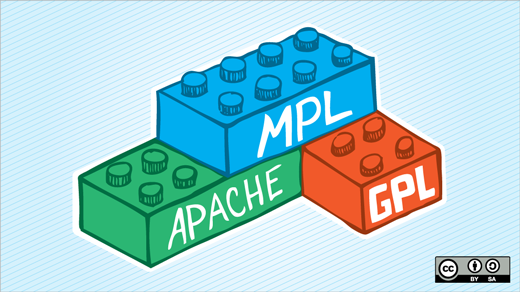Free software licenses can be divided into two broad categories: copyleft licenses (like the GPL), which require derivatives of the software to be licensed under the same terms; and permissive licenses (like the MIT/X11 license), which allow the software to be reused in any project, even closed-source projects. There are variations, of course—the LGPL, for example, is a 'weak copyleft', allowing licensed works to be used in closed-source works, but requiring improvements to the work itself to be released under a copyleft license.
The licenses express a difference in opinion about free-riding and user rights. The copyleft licenses, championed by Stallman and the Free Software Foundation, explicitly focus on the importance of preserving the freedoms of downstream users, who may lose the ability to use, examine, share, and improve the software. In this way, the copyleft requirement reflects an instrumental goal to increase the free software commons and safeguard the freedom of future users.
Implicitly, however, the licenses also reflect a particular view about fairness: a sense that it is wrongful for others to take from the commons without sharing in turn. The permissive licenses, on the other hand, do not treat free-riding as harmful; instead, they reflect a particular view which seeks to maximise the utility of software by refusing to restrict free-riders from appropriating its benefits.
A 2008 study by Sen, Subramaniam, and Nelson found that intrinsic motivations (beliefs about redistribution rights or social benefits of FLOSS) have a stronger effect on license choice than extrinsic motivations (expection of reputation or economic gain). Perhaps not surprisingly, the study also showed that developers who agreed with the statement that "OSS licenses should give everyone the freedom to distribute derivative software under any license," were "approximately 72 percent less likely to choose a Strong-Copyleft over a Non-Copyleft license."
Conversely, developers who saw FOSS development as one of their "social responsibilities," "duty towards society," or "social obligation" were "approximately 52 percent more likely to choose Strong-Copyleft over Non-Copyleft" licenses. This suggests that a developer’s view about the morality of software licensing is a strong, but not necessarily decisive, factor in license choice.
It seems intuitive that views about user rights and social responsibilities inform license choice. It is probably more important to ask where these views come from and how they propagate.
The choice of license appears likely to be substantially determined by social norms. A recent study by Singh and Phelps suggests that "the most important factor determining a new project’s license choice is the type of license chosen by existing projects that are socially closer to it in its inter-project social network." Less experienced managers of free software projects, in particular, are strongly susceptible to influence from others, and the licenses chosen by similar projects has a strong influence on license choice.
The choice between copyleft and permissive free software licenses illustrates two fascinating points:
- Whether developers feel harmed by free-riding may be largely a result of the norms of their social network. This could have significant ramifications, since it effects their willingness to voluntarily participate in projects in the face of free-riding.
- The copyleft licenses are a neat hack of traditional copyright practices that enable developers to set boundary conditions that create a commons that is neither fully closed nor fully open. The GPL is non-discriminatory—it allows any potential user to join the commons, but imposes certain rules of participation. By doing so, it articulates a set of boundary conditions that are important to the community, but stops well short of total exclusivity.
The interesting question for me is how this might play out in other fields. Many Kickstarter projects, for example, are almost fully funded by a large crowd of backers and only made available to those backers and future purchasers. These commons are closed; free-riders are excluded from access. What then, might motivate the choice of some producers to release their content under an open license once it has been funded?
Experiments like commonly.cc and unglue.it (discussed here and here before) show that there is movement in some of these attitudes and suggest the possibility that pro-sharing norms might spread to influence other producers.
Originally posted on Nicolas Suzor's blog. Reposted using Creative Commons.







8 Comments